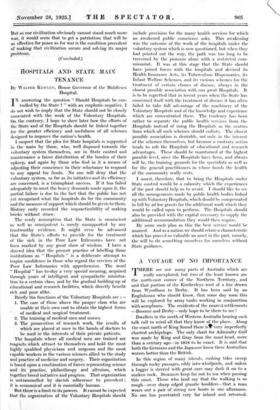flOSPITALS AND STATE MAIN- TENANCE By WALTER KEwLEy, House Governor
of the Middlesex - - Hospital.
IN . answering the question Should Hospitals be con- trolled by the State ? " with an .emphatic negative, I do not wish to imply that the State-should not be closely associated with the work 'of the' Voluntary Hospitals. On the Contrary,- I hope to shoW later how the' efforts of the State and of the Hospitals should be linked together for the greater efficiency and usefulness of all schemes designed to improve the nation's health.
. I suspect that the _plea for State hospitals is supported in the main by those, who, • well disposed towards the voluntary system 'themselves, see in State control and maintenance a fairer distribution of the burden of their upkeep, and again by those who find in. t a means of adjusting their conscience to their reluctance to respOnd to any appeal for. funds. No one will deny that the voluntary.system; so far as its initiative and its efficiency Are concerned, is a triumphant success. - If it has failed adequately to meet the heavy demands made upon it, the partial-failure is due to the fact that the public has not yet recognized what the hospitals chi for the community and the measure of support which should be given to them. History early. recorded the impracticability of making bricks- without straw. ..
The ready assumption that the State is omniscient as well as omnipotent is surely unsupported by any trustworthy - evidence. - It might- even be advanced that the State's efforts to provide for the treatment of the- sick in the Poor Law Infirmaries have not been marked by any great show of wisdom. I have a shrewd idea that the present practice of labelling those institutions as " Hospitals " is a deliberate attempt to inspire confidence in those who regard the services of the Poor Law Infirmaries with apprehension. The word " Hospital " has to'-day a 'very special meaning, acquired through yeara of intelligent and sympathetic ministra- tion to a certain class, and by the gradual building-up of educational and research facilities, which directly benefit rich and poor alike.
Briefly the functions of the Voluntary Hospitals are :— 1. - The care of those above the pauper class who are unable-at their own cost to obtain the highest forms of medical and surgical treatment: 2. The training of medical men and nurses.
S. The prosecution - of research work, the results of which 'are placed at -once in the-hands of doctors to _ be used in the interests of . their private patients.
The- hospitals where all medical men are trained are magnets which -attract :to themselves and hold the most highly qualified physicians and surgeons and the most -capable workers hi the various sciences allied to the Study And practice of medicine and surgery. Their organization 'is based upon a combination of forces representing science 'and- its practice,' philanthropy and Altruism, which together breed initiiatiN.-e and progress. That organization is- untrammelled by -slavish adherence' to precedent ; it is economical and it is essentially human.
- But thereis a limit to its powers. It cannot be expected that the organization of the Voluntary Hospitals should include provision for the many health services - for which an awakened public conscience asks. This awakening was the outcome of the''work of the hospitals under the Voluntary syStem which is now questioned, but when they . had pointed out the way, the path was too long to be traversed by the pioneers alone with a restricted cons- missariat. It was at this stage that the State should have joined forces with the hospitals and devised its Health Insurance Acts, its Tuberculosis Dispensaries, its Infant Welfare Schemes, and its various schemes -for the treatment of certain classes of disease, always in the closest possible association with our great Hospitals. It is to be regretted that in recent years when the State has concerned itself with the treatment of disease it has often failed to take full advantage of . the machinery of the Voluntary Hospitals and of the knowledge and experience which are concentrated there. The tendency has been rather to separate the public health services from the Hospitals instead of using the Hospitals as the centres from which all such 'schemes should radiate. The closest possible association is desirable, not only in the interest of the schemes themselves, but because a contrary action tends to rob the Hospitals of educational and research advantages. These should be maintained at the highest possible level, since the Hospitals- have been, and always will be, the training grounds for the specialists as well as for the general practitioners in whose hands the health of the community' really rests.
I assert, therefore, that to bring the Hospitals under State control would be a calamity *Mai the experiences of the past should help us to avoid: I should like to see all the arrangeinenta made by public health bodies linked up with Voluntary Hospital's, which should be compensated in full by ad hoc granta for the additional. work which they would be called upon to perform.. The HoSpitals should also be provided with the capital necessary to supply. the additional accommodation they would then require. '- By some such plan as this the best service would be assured. And as a nation we should retain a characteristic -Which has Proved so valuable an asset in the past, namely, the will to dO something ourselves for ourselves without State guidance.






















































 Previous page
Previous page